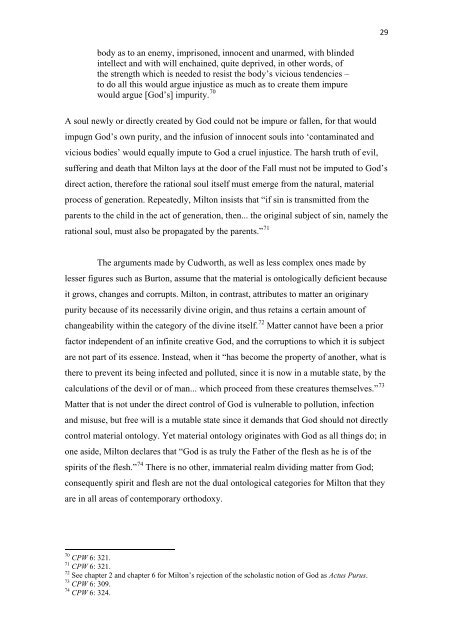Medical Science and the Anatomia Animata in Milton's Paradise Lost
Medical Science and the Anatomia Animata in Milton's Paradise Lost
Medical Science and the Anatomia Animata in Milton's Paradise Lost
Create successful ePaper yourself
Turn your PDF publications into a flip-book with our unique Google optimized e-Paper software.
ody as to an enemy, imprisoned, <strong>in</strong>nocent <strong>and</strong> unarmed, with bl<strong>in</strong>ded<br />
<strong>in</strong>tellect <strong>and</strong> with will encha<strong>in</strong>ed, quite deprived, <strong>in</strong> o<strong>the</strong>r words, of<br />
<strong>the</strong> strength which is needed to resist <strong>the</strong> body’s vicious tendencies –<br />
to do all this would argue <strong>in</strong>justice as much as to create <strong>the</strong>m impure<br />
would argue [God’s] impurity. 70<br />
A soul newly or directly created by God could not be impure or fallen, for that would<br />
impugn God’s own purity, <strong>and</strong> <strong>the</strong> <strong>in</strong>fusion of <strong>in</strong>nocent souls <strong>in</strong>to ‘contam<strong>in</strong>ated <strong>and</strong><br />
vicious bodies’ would equally impute to God a cruel <strong>in</strong>justice. The harsh truth of evil,<br />
suffer<strong>in</strong>g <strong>and</strong> death that Milton lays at <strong>the</strong> door of <strong>the</strong> Fall must not be imputed to God’s<br />
direct action, <strong>the</strong>refore <strong>the</strong> rational soul itself must emerge from <strong>the</strong> natural, material<br />
process of generation. Repeatedly, Milton <strong>in</strong>sists that “if s<strong>in</strong> is transmitted from <strong>the</strong><br />
parents to <strong>the</strong> child <strong>in</strong> <strong>the</strong> act of generation, <strong>the</strong>n... <strong>the</strong> orig<strong>in</strong>al subject of s<strong>in</strong>, namely <strong>the</strong><br />
rational soul, must also be propagated by <strong>the</strong> parents.” 71<br />
The arguments made by Cudworth, as well as less complex ones made by<br />
lesser figures such as Burton, assume that <strong>the</strong> material is ontologically deficient because<br />
it grows, changes <strong>and</strong> corrupts. Milton, <strong>in</strong> contrast, attributes to matter an orig<strong>in</strong>ary<br />
purity because of its necessarily div<strong>in</strong>e orig<strong>in</strong>, <strong>and</strong> thus reta<strong>in</strong>s a certa<strong>in</strong> amount of<br />
changeability with<strong>in</strong> <strong>the</strong> category of <strong>the</strong> div<strong>in</strong>e itself. 72 Matter cannot have been a prior<br />
factor <strong>in</strong>dependent of an <strong>in</strong>f<strong>in</strong>ite creative God, <strong>and</strong> <strong>the</strong> corruptions to which it is subject<br />
are not part of its essence. Instead, when it “has become <strong>the</strong> property of ano<strong>the</strong>r, what is<br />
<strong>the</strong>re to prevent its be<strong>in</strong>g <strong>in</strong>fected <strong>and</strong> polluted, s<strong>in</strong>ce it is now <strong>in</strong> a mutable state, by <strong>the</strong><br />
calculations of <strong>the</strong> devil or of man... which proceed from <strong>the</strong>se creatures <strong>the</strong>mselves.” 73<br />
Matter that is not under <strong>the</strong> direct control of God is vulnerable to pollution, <strong>in</strong>fection<br />
<strong>and</strong> misuse, but free will is a mutable state s<strong>in</strong>ce it dem<strong>and</strong>s that God should not directly<br />
control material ontology. Yet material ontology orig<strong>in</strong>ates with God as all th<strong>in</strong>gs do; <strong>in</strong><br />
one aside, Milton declares that “God is as truly <strong>the</strong> Fa<strong>the</strong>r of <strong>the</strong> flesh as he is of <strong>the</strong><br />
spirits of <strong>the</strong> flesh.” 74<br />
There is no o<strong>the</strong>r, immaterial realm divid<strong>in</strong>g matter from God;<br />
consequently spirit <strong>and</strong> flesh are not <strong>the</strong> dual ontological categories for Milton that <strong>the</strong>y<br />
are <strong>in</strong> all areas of contemporary orthodoxy.<br />
70<br />
CPW 6: 321.<br />
71<br />
CPW 6: 321.<br />
72<br />
See chapter 2 <strong>and</strong> chapter 6 for Milton’s rejection of <strong>the</strong> scholastic notion of God as Actus Purus.<br />
73<br />
CPW 6: 309.<br />
74<br />
CPW 6: 324.<br />
29
















